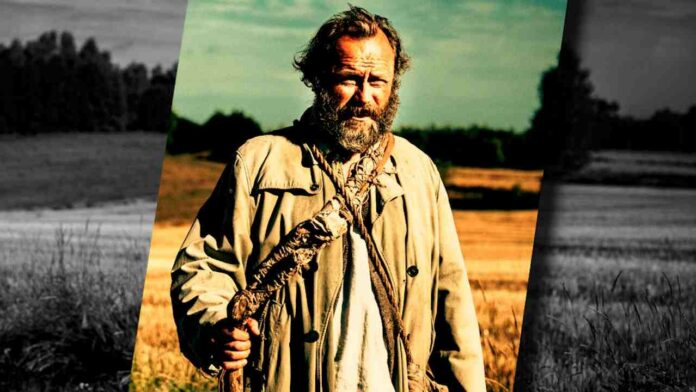Michal Gazda’s Forgotten Love (Zanchor in the original Polish language) had a lot going against it. The novel, which is also called Zanchor,”on which Gazda’s Netflix film is based, has already been adapted twice before: once back in 1937, the same year the book was released, and then in 1985. The 1985 adaptation, The Quack, was helmed by acclaimed Polish director Jerry Hoffman. I saw the widely appreciated film years ago, and as I went into the new film not knowing this, it took me a while to figure out that this one also happens to follow the same story. The interesting thing is, I soon forgot about that and didn’t even know how two and a half hours passed by.
In this day and age, a runtime of more than two hours is actually quite a big deal, unless it is a superhero/franchise film or something like Oppenheimer. Considering that, Gazda’s 140-minute-long Polish drama, which is also on Netflix, is quite a gamble. But it pays off, thanks to Gazda’s choice of remaining faithful to the original story and sticking to the basics. That doesn’t mean Forgotten Love has nothing new to offer for people who have seen it before. This one has Netflix’s brilliant production value, significantly impactful color grading that keeps changing, intriguing camera work, and a glorious background score that ably supports the narrative. Not to mention, watching the film should be an enthralling experience for you if you are not aware of the novel or the earlier films, provided you don’t mind sitting patiently through a period drama.
Don’t get me wrong here; Forgotten Love is very captivating. Each scene of the movie is crafted with the utmost care. The screenplay is solid enough to hold the audience, and Gazda’s deft direction makes sure that the ship sails through smoothly. But a certain amount of patience and a penchant for stories that are set in the past is a necessity here if you want to fully appreciate the film.
Speaking of the story, I always tend to hail the technical craft of a film more than its story. Film is a whole different medium compared to literature, and a lot of things other than the content matter here. However, in the case of Forgotten Love, the story is actually the reason it works. I haven’t had the pleasure of reading Tadeusz Dolega-Mostowicz’s original novel, but after witnessing two genuinely good adaptations on screen, it’s fair to say that this story happens to be a timeless classic with a universal appeal.
My personal preference would be to go into this film totally blind, but I understand some of you would be curious about what it is about and would make your decision based on that, so here’s what happens. It opens with the good doctor, Rafal Wilczur, who happens to be a brilliant surgeon. The time period is supposed to be the beginning of the twentieth century. Despite having a thriving career, Rafal is not on a high when it comes to his marital life. However, the man has an incredibly solid, very loving bond with his daughter, Marysia. An ill-fated Rafal is left by his wife, and then his life takes a turn for the worse when he gets mugged on a fateful night, which eventually leads him to lose his memory. The rest of the story follows the journey of a man who has lost everything, including the precious memory of his own daughter, while trying to solve a puzzle and find a purpose. It is a very old-school parent-child tale, and it wouldn’t be a spoiler if I told you that Rafal eventually meets his daughter after years, and from there on, the story takes you on an emotional rollercoaster. Actors Leszek Lichota and Maria Kowalska are fantastic as Rafal and adult Marysia and carry the film together on their shoulders. They are complemented well by a supporting cast full of competent actors. What I thought was particularly impressive was that the opening scene of the film was a very warm, loving scene between Rafal and Marysia as a child. Gazda makes it very clear what the film is about, and you get hooked on it from the very first minute.
I might be deviating a bit here, but in general, there is a certain stigma against remakes, especially amongst modern-day cinema enthusiasts. Not long ago, I used to side with this brigade, but this is not how things should be. I am an admirer of the original, but there is nothing wrong with telling the same story again and again because a story that has value can always work if it is told well. Especially, if you think about it, the likes of Martin Scorcese’s The Departed (2006) and James Mangold’s 3:10 to Yuma are remakes that clearly prove my point. Gazda’s adaptation of Zanchor is a burning example of that. The director has previously proven his skill at adapting novels in last year’s Hold Tight, the Netflix miniseries that was based on the popular Harlan Coben book, and after Forgotten Love, I would say Gazda is a force to be reckoned with in modern-day Polish cinema.
To put things further into perspective, I would ask you all to imagine a comfort meal that you have had so many times before. But you definitely wouldn’t mind trying it again on a day when you are not particularly in the mood to try out something new. And even though it is a meal you are familiar with, there is always a chance of experiencing something new. This is exactly how I would describe Michal Gazda’s Forgotten Love, a film that tells the inspiring story of finding everything after losing it. Whether you have watched the earlier films and read the book, or you are watching the story unfold for the first time, this one should work for you.

